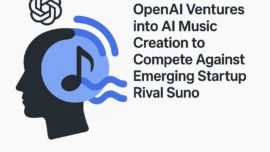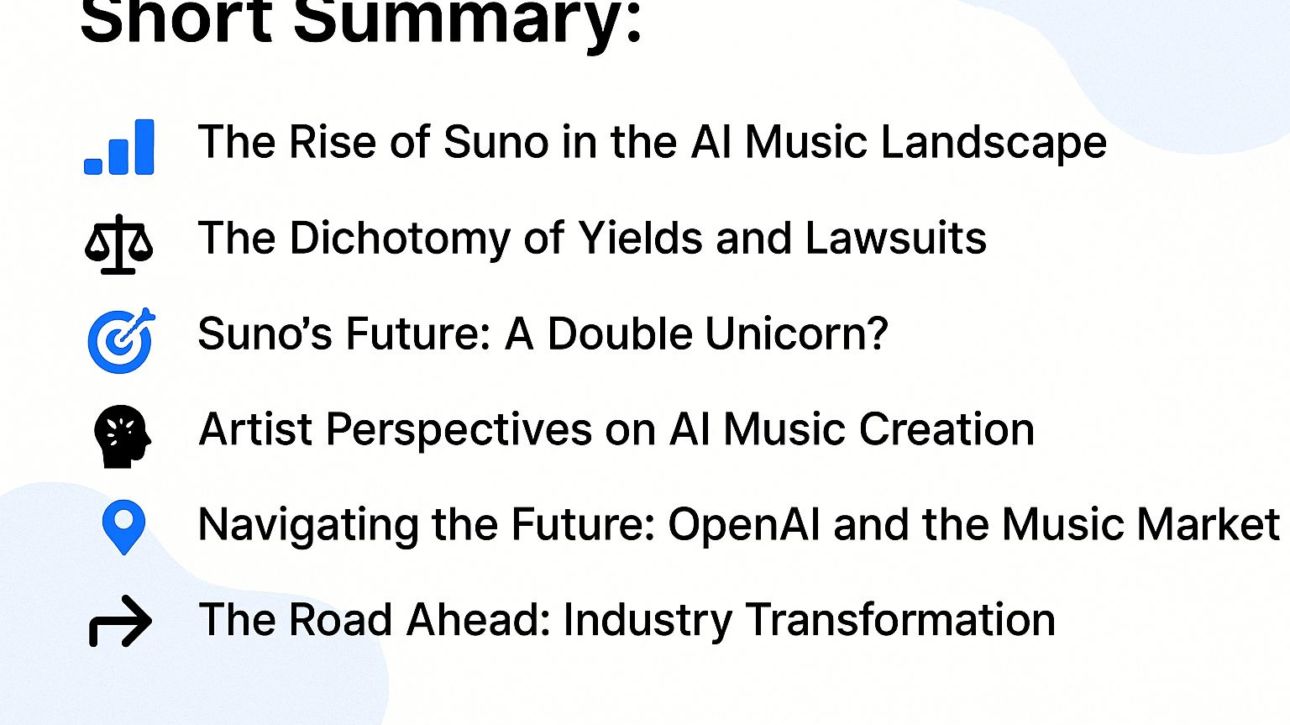
OpenAI is venturing into the competitive realm of AI-driven music creation, hoping to gain an upper hand against the emerging player, Suno, which recently secured substantial funding amid ongoing legal challenges.
Contents
Short Summary:
- OpenAI is developing AI technology to create music, similar to its advancements in video generation.
- Suno, an AI music startup, is navigating lawsuits while raising significant capital.
- The competition raises questions about the future of AI-generated music and its impact on artists.
In a world that constantly blurs the lines between technology and creativity, OpenAI is stepping into the spotlight of AI music creation—a burgeoning field that has recently captured significant investor attention. With startups like Suno making headlines due to their impressive funding and ambitious developments, OpenAI’s move indicates an eagerness to not just participate in, but to lead the transformation of music production through Artificial Intelligence.
OpenAI, known for its groundbreaking work in various AI applications, is reportedly working on a music-generation tool that can create compositions based on text prompts. A source familiar with the matter revealed that the company is collaborating with students from the prestigious Juilliard School to refine this technology.
“We believe that music, like text, has the potential to be generated through AI in a way that reflects human creativity and emotion,” said an OpenAI spokesperson.
This innovative approach aligns OpenAI’s past initiatives in generative media with a new venture in music, where the company hopes to streamline music creation and empower both artists and hobbyists alike. This advancement comes at a time when AI’s intersection with various forms of art is hotly debated—and for good reason. AI’s ability to create music, particularly in a landscape already made complex by companies like Suno, prompts critical questions about creativity, ownership, and the monetization of synthesized outputs.
The Rise of Suno in the AI Music Landscape
Suno, an AI music startup that has garnered attention for its prowess in generating tunes, has been on an aggressive growth trajectory. Recently, it raised a whopping $125 million in May 2024, pushing its valuation to an impressive $2 billion. However, as reported by Bloomberg, Suno is not resting on its laurels. The company is currently negotiating another funding round, potentially looking to reel in over $100 million, notwithstanding the legal clouds looming above it.
“Suno is generating more than $100 million in annual recurring revenue from subscriptions to its service, which is a testament to the demand for AI-generated music,” a Bloomberg analyst commented.
Despite this impressive revenue, Suno faces formidable legal challenges from major music labels, including Universal, Warner, and Sony, who are accusing the startup of improper usage of copyrighted music. As Suno treads the precarious path of seeking new investments while contending with lawsuits, industry observers are left pondering several critical questions.
The Dichotomy of Yields and Lawsuits
One major concern is whether Suno can successfully close its new funding without resolving the disputes with record labels. The intricate dance between seeking new capital and legal resolution showcases the complexities of a rapidly evolving industry. Notably, these major labels, traditionally adversarial towards AI-generated content that can compete with human artists, are now also potentially positioning themselves as investors. This could lead to a precarious mixture of competition and collaboration within the same ecosystem.
The alleged contradiction in Suno’s legal strategies raises ethical concerns: can the company genuinely thrive without navigating the treacherous waters of intellectual property laws? As federal cases grow in number regarding the usage of AI in creative spaces, transparency in dealings with artists and rightsholders will be paramount. Artists and songwriters, as stakeholders in this conversation, will be vigilant about how the results of these funding rounds and any subsequent licensing agreements play out.
Suno’s Future: A Double Unicorn?
The potential designation of Suno as a “double unicorn” raises both excitement and apprehension. Investors are eager for returns, but the creative community is increasingly wary of the implications of AI music generation. Indeed, the output from these AI companies competes directly with the work of professional artists, igniting a debate about originality and creativity.
“The music industry must reckon with the looming presence of AI-generated music that may disrupt traditional forms of artistry,” argues a music industry analyst at MIDiA Research.
With OpenAI’s entry into this sector, the stakes are raised even higher. AI’s capabilities are expanding swiftly and, with OpenAI’s formidable reputation and resources, it could soon be a major contender for Suno’s share of the market. OpenAI has already made waves with its advancements in creating AI-generated videos from text prompts, and now, the company is dedicated to harnessing the same magic for music, potentially undermining competitor platforms in the realm of digital creativity.
Artist Perspectives on AI Music Creation
As these developments unfold, artists are expressing a multitude of sentiments towards AI-generated music. Some view it as a valuable tool that can facilitate creativity, while others are understandably skeptical, concerned that its rise could devalue the work of human musicians. Many believe that the music industry has historically cycled through technological upheavals, from the advent of digital recording technology to streaming services, and is now at the threshold of another shift—this time, propelled by Artificial Intelligence.
Yet, the necessity for ethical frameworks and regulations governing AI outputs is also gaining attention. As major artists gaze at the horizon of technological change, many advocate for a model of partnership rather than direct competition—suggesting that AI should augment, not replace, the artist’s touch.
“AI should be seen as a creative partner, not a competitor,” noted a renowned musician during a recent panel discussion on the future of music.
As OpenAI sets out to design its AI music capabilities, predictions about the outcomes of its endeavors vary widely. Some experts argue that the tools produced will spur a new wave of creativity, enabling artists to experiment with styles and genres that they might not have otherwise considered. Others caution that as these technologies mature, they could challenge the very existence of traditional music careers.
The role of AI in generating music may lead to a hybrid model, where technology enhances human artistry. Companies like Autoblogging.ai that harness AI for content creation provide useful insights that highlight the value of marrying technology with human creativity in all forms. By focusing on the development of AI tools that make content generation accessible and effective, there tends to be a focus on complementing human efforts, rather than overshadowing them.
While the future remains uncertain, the increasing interplay between AI and music calls for exploration, discussion, and regulations that prioritize the integrity and rights of artists. As OpenAI and Suno navigate their paths, with differing strategies and challenges, their movements will set important precedents for the intersection of technology and artistry.
The Road Ahead: Industry Transformation
As we move forward, it is crucial to examine the implications of AI for the music industry in the context of creativity, collaboration, and financial sustainability. Both OpenAI’s innovation in music and Suno’s burgeoning empire signal a transformative era. The stakes—both legal and artistic—are high. Investors, artists, and producers must engage in conversations around how AI reshapes the landscape to encourage a healthy coexistence of technology and human creativity.
Suno’s situation—fighting legal battles while seeking fresh funding—serves as a stark reminder that innovation demands not just creativity and investment, but a commitment to ethical standards and clear communication with affected stakeholders. Meanwhile, OpenAI’s foray into music creation brings a wave of excitement, inviting challenges that will undoubtedly reshape our understanding of artistic expression. As discussions evolve, we will collectively shed light on how these giants navigate their respective journeys in the creatively turbulent seas of artificial intelligence.
For readers wanting to keep up with the latest happenings surrounding AI and its impacts on industries like music, you can explore further insights in our Latest AI News section. Moreover, those interested in boosting their blogging capabilities with AI can check out our suite of tools at Autoblogging.ai.
Do you need SEO Optimized AI Articles?
Autoblogging.ai is built by SEOs, for SEOs!
Get 30 article credits!


